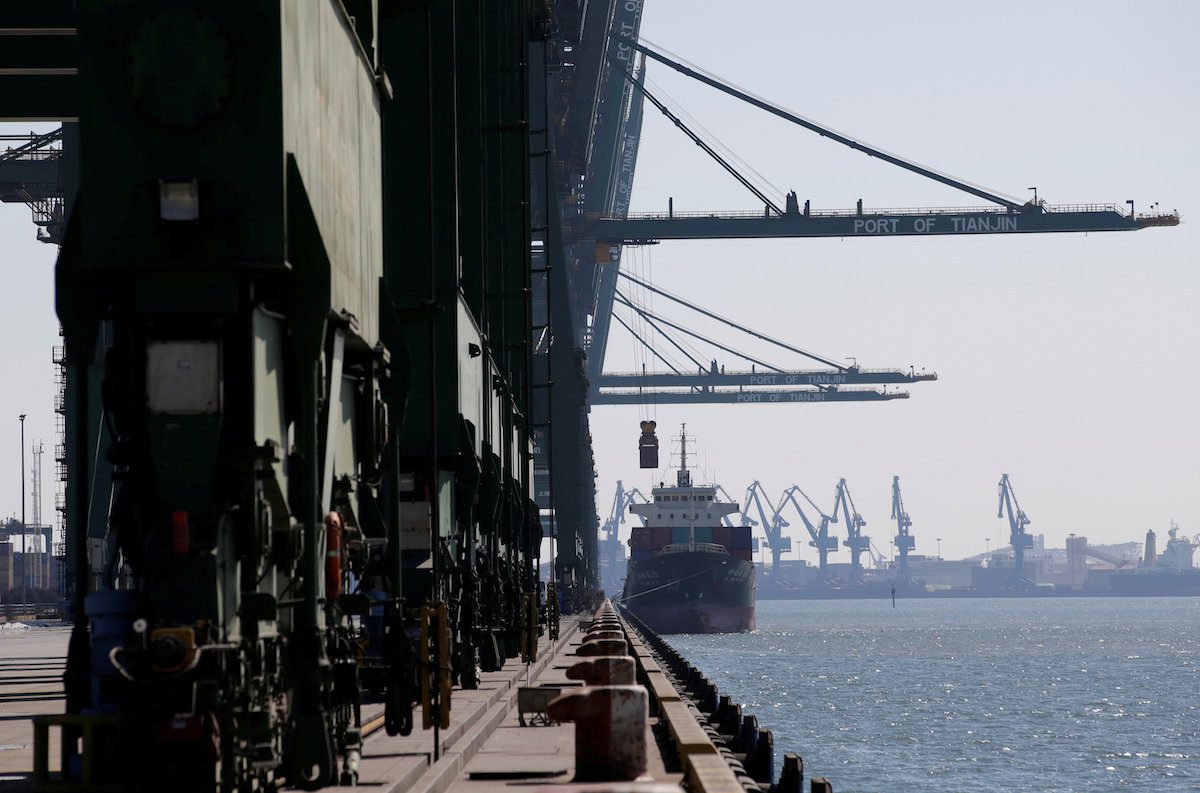U.S. Inbound Containers Surge to Start 2024
By Gavin van Marle (The Loadstar) – The main US ports enjoyed another stellar month in March, according to new figures from noted analyst John McCown His figures show imports at...


FILE PHOTO: A container is carried away from a cargo ship at Tianjin Port, in northern China February 23, 2017. REUTERS/Jason Lee/File Photo
![]()
![]()
Tianjin Port Development Holdings Ltd said late on Tuesday it would move to expand its containerised volumes following a big drop in coal and steel cargoes after a ban earlier this year on using trucks at the port to transport coal, part of Beijing’s battle with pollution.
Its coal handling in the first half fell by 24 percent and steel throughput was down by 27 percent, while the handling of metal ores also decreased. Non-containerised business accounted for only 12 percent of interim revenue.
Tianjin, China’s second-largest port by cargo volume, is the key hub for trading 100 million tonnes a year of seaborne coal and domestic coal from Inner Mongolia.
Coal delivered to the port must now be handled by rail for long-distance transportation, which hurt the port’s non-containerised cargo business, it said.
That has forced traders and shippers to divert cargoes to Tianjin’s competitors, like Tangshan Port Group Co Ltd 100 km to the north, and Qinhuangdao Port Co Ltd , both in Hebei province, according to an analysis of results released in recent weeks by five major ports operating in the Bohai Rim region.
The analysis includes Bohai Rim ports of Tangshan, Rizhao Port Co, Qinghuangdao Group, which includes Caofeidian, Huanghua and Qinghuangdao Port, as well as Qingdao Port International Co Ltd.
The analysis is the first collection of data illustrating the impact of the March transportation ban and how the measures are disrupting the flow of coal and other crucial commodities in China.
Beijing has said it may extend the transport measure to ports in the heavily industrialised Hebei province.
Tianjin was the only port to report lower throughput and volumes of coal and metal ores, in the first half of the year.
Total cargo throughput in the first half was 218.2 million tonnes, down 7.3 percent year-on-year mainly due to the decrease in volumes of non-containerised cargo, the port’s main revenue driver, it said.
Given the challenges of more stringent environmental and safety policies and competition from nearby ports, Tianjin said it will accelerate efforts to develop its container business, expand its logistics business and build a one-stop logistics service among other measures.
Qinghuangdao appears to be the main beneficiary, reporting an increase of as much as quarter in its coal and metal ore cargoes to more than 175 million tonnes. It was the biggest rise among the five ports.
“Growth in coal cargo volumes was supported by the improving economy, increasing power output and consumption. Due to the environmental crackdown, more coal transportation was diverted to Qinghuangdao,” the port said.
Even as Tianjin’s neighbours benefited, Tangshan warned it is facing increasing competition from all its rivals and noted that the environmental crackdown could hurt overall coal volumes for the entire port industry. ($1 = 7.8249 Hong Kong dollars)
(Reporting by Josephine Mason and Meng Meng; Additional reporting by Brenda Goh in SHANGHAI; Editing by Richard Pullin and Tom Hogue)
(c) Copyright Thomson Reuters 2017.
Join the gCaptain Club for curated content, insider opinions, and vibrant community discussions.


Join the 105,963 members that receive our newsletter.
Have a news tip? Let us know.
Access exclusive insights, engage in vibrant discussions, and gain perspectives from our CEO.
Sign Up




Maritime and offshore news trusted by our 105,963 members delivered daily straight to your inbox.



Essential news coupled with the finest maritime content sourced from across the globe.
Sign Up